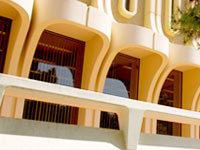


On October 23, the Library Speaker Series featured UCI Professor Emeritus of English Robert Folkenflik in an illustrated talk on book collecting based on his lifetime experience of building a personal literary collection.
A professor of English for over 30 years before retiring in June of 2006, Folkenflik is the author of seven books on autobiography, biography, Samuel Johnson, and other topics, and has edited the Modern Library edition of Sterne’s Tristram Shandy. He has also published over fifty essays and reviewed 175 books.
 University Librarian Gerry Munoff with Robert Folkenflik
University Librarian Gerry Munoff with Robert FolkenflikFolkenflik presented images of books from his and his wife’s extensive collection of English and American literature, mainly from the 17th and 18th centuries and talked about the characteristics of books that make them more valuable and special, as well as tips on where to find rare books.
“Just as for realtors the mantra is location, location, location, for book collectors the mantra is condition, edition, condition,” he said. “Typically first editions are most valuable but later editions can often have appeal depending on various factors. A book that has been inscribed by the author often has more value,” he said, “as well as books with plates or special bindings.” A book’s value can also depend on its being part of a themed collection, such as those by a particular author or owner, or particular genres such as nonfiction books or biographies, or science books for instance.
Folkenflik described how the Internet has made it easier to find rare books and determine the value of them. He also suggested the merit of donating rare books to a library for tax purposes because one may be able to write off the full fair value of the book as opposed to selling it and receiving about half the retail price.
While some collectors are in it for profit, Folkenflik made it clear that his collecting has been based on fun and scholarship. “Some of the books knock your eyes out,” he said. “When I’ve seen some of these books from earlier centuries, I’ve had no idea that such things existed, and they are extraordinary. They’re not what we see in our own culture.” 